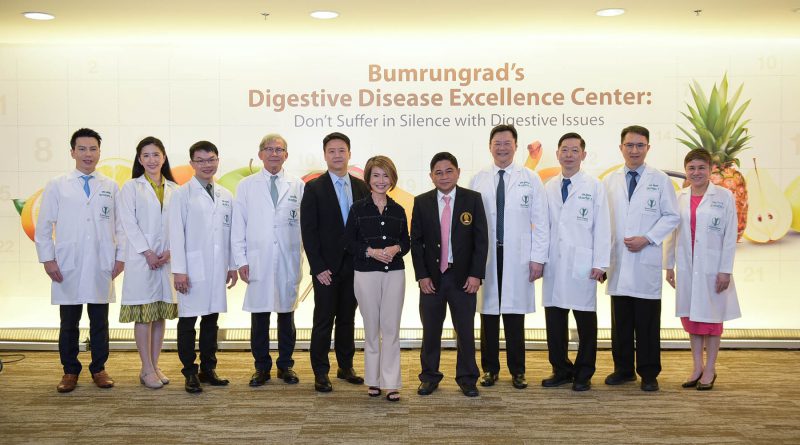Bumrungrad has enhanced its Digestive Disease Center, enabling its medical team to utilize the latest technology to provide accurate diagnosis and comprehensive treatments for all gastrointestinal and liver problems.
Bumrungrad has enhanced its Digestive Disease Center, enabling its medical team to utilize the latest technology to provide accurate diagnosis and comprehensive treatments for all gastrointestinal and liver problems.
Modern lifestyles and environmental factors have contributed to a rise in various risk factors for diseases, including dietary habits and genetic predispositions. This has led to a notable increase in the occurrence of gastrointestinal (GI) tract and liver conditions, significantly impacting the quality of life for many patients. Managing these conditions can be intricate.

At Bumrungrad’s Digestive Disease Center, we recognize the growing prevalence of GI conditions and are dedicated to delivering top-notch treatment. Our specialized team of experienced GI specialists is committed to providing high-quality care to address these complex issues and enhance the well-being of our patients.
In 2022, Bumrungrad’s Digestive Disease Center joined forces with the Center of Excellence in Neurogastroenterology and Motility at the Faculty of Medicine, Chulalongkorn University. This collaborative effort aimed to elevate the standards of medical care and enhance the quality of healthcare provided.

In the year 2023, Bumrungrad’s Digestive Disease Center took a significant step by expanding its services to align with rigorous international standards. This expansion enabled us to offer an even more comprehensive and elevated level of care to our patients.

Ms. Artirat Charukitpipat, CEO of Bumrungrad International Hospital, reveals that, “Throughout Bumrungrad International Hospital’s 43-year journey, we’ve remained steadfast in our quest to elevate care and treatment standards while establishing centers of excellence for specialized healthcare. Recognizing the pivotal role the digestive system plays in our overall well-being, we understand its undeniable impact on one’s quality of life. Recent years have witnessed a concerning uptick in cases of gastrointestinal (GI) and liver diseases. In response to this pressing concern, Bumrungrad is dedicated to providing holistic care for individuals grappling with both common and intricate GI tract and liver issues. Our approach involves delivering specialized care by a highly skilled team of doctors who harness the latest medical advancements to ensure precise diagnoses and effective treatments for those entrusted to our care.”

Asst. Prof. Dr. Yudhtana Sattawatthamrong, Director of the Digestive Disease (GI) Center at Bumrungrad International Hospital, states that “The Bumrungrad’s Digestive Disease Center aspires to be the foremost choice for GI care, attracting patients not only from Thailand but across the globe. Annually, we extend our expert care to over 43,000 patients. Presently, our center houses a range of specialized clinics, each dedicated to addressing specific gastrointestinal concerns:
- General GI Clinic
- Gastrointestinal Motility Center
- Endoscopy Center
- Pancreatic Care Clinic
- GI Genetics Clinic
- Inflammatory Bowel Disease (IBD) Clinic
- Liver Disease Clinic
- Integrative Microbiome Clinic
Our accomplished team of specialist doctors is unwavering in their commitment to providing the best possible care for our patients, aligning with the hospital’s policy. The inclusion of these specialized clinics significantly augments our capacity to:
- Provide Accurate and Precise Diagnosis: Enabling us to carry out meticulous diagnoses for a wide array of GI conditions.
- Offer Early Detection through Advanced Technology: Utilizing cutting-edge medical technology to identify conditions at their earliest stages.
- Leverage Collective Expertise for Effective Treatment: Drawing on the extensive experience and expertise of our doctors to devise effective treatment plans, ultimately enhancing our patients’ quality of life.”

Prof. Dr. Sutep Gonlachanvit, Director of the Gastrointestinal Motility Center at Bumrungrad International Hospital, states “Gastrointestinal (GI) motility disorder issues are prevalent among patients and if left undiagnosed and untreated, patients can experience chronic intermittent gastrointestinal problems. These conditions can profoundly affect the entire GI tract, from the esophagus to the rectum and anus. For instance, acid reflux can afflict the esophagus, while stomach problems might stem from stomach function abnormalities that standard endoscopy cannot detect abnormalities which can explain the symptoms/. Patients grappling with intestinal issues like Irritable Bowel Syndrome (IBS) may endure distressing symptoms such as bloating and constipation. While general physicians can address GI problems to a certain extent, some patients endure a generic course of treatment with limited symptom relief. At the Gastrointestinal Motility Center, Bumrungrad International Hospital, our team of doctors capitalizes on their expertise and the latest medical technology to effectively manage patients dealing with complex or challenging cases with gastrointestinal motility disorders. Biofeedback therapy is one such approach that proves beneficial for GI motility issues, offering relief for constipation resulting from inappropriate pushing during defecation. This technique boasts a success rate of 60% in providing complete symptom relief and offers partial relief for the remaining cases, even reducing patient reliance on medication.
Additionally, we harness technology to measure the presence of stomach acid in the esophagus and meticulously record the frequency and severity of acid reflux episodes. This vital data empowers our doctors to make precise diagnoses and craft effective treatment plans for patients suffering from gastroesophageal acid reflux. Our doctors judiciously select the most suitable diagnostic technology, ensuring our patients receive the best care through accurate diagnosis and effective treatment strategies.”

Clinical Assoc. Prof. Dr. Tossapol Kerdsirichairat, Gastroenterologist & Advanced Endoscopy Specialist at Bumrungrad International Hospital, states “The Digestive Disease Center employs cutting-edge endoscopic technology to comprehensively assess GI health, offering a thorough examination from the esophagus to the stomach and intestines. These advanced endoscopes can be introduced into the body either through the mouth or rectum. Endoscopy serves as a powerful diagnostic tool, capable of detecting and identifying abnormal intestinal tissues and diseases. It not only facilitates real-time identification but also allows for the simultaneous removal of problematic tissues or the collection of tissue samples for further testing and precise diagnosis.”
One of the significant advantages of endoscopy is its non-invasive and non-surgical nature, which significantly reduces patient recovery time and minimizes the potential for complications. The Digestive Disease Center provides a range of specialized endoscopic procedures tailored to address specific gastrointestinal conditions and patient needs. These advanced procedures contribute to early detection, accurate diagnosis, and effective treatment planning, ultimately improving patient care and outcomes.
Some notable endoscopic procedures offered at the Digestive Disease Center include:
- ERCP (Endoscopic Retrograde Cholangiopancreatography):
- Used to diagnose the presence of stones, tumors, or narrowing/blockages in the biliary and pancreatic ducts.
- EUS (Endoscopic Ultrasound):
- Combines endoscopy with ultrasound imaging to visualize organs near the GI tract and collect tissue samples for precise diagnosis, particularly in cases where standard endoscopy may not suffice.
- FTRD (Full-Thickness Resection Device):
- Primarily utilized to resect pre-cancerous or early-stage malignant tissue in the large intestine and stomach. It can non-surgically remove up to 3 cm of tissue without leaving a scar on the patient’s stomach.
- TIF (Transoral Incisionless Fundoplication):
- Sutures the esophageal sphincter via an oral entry endoscope to treat acid reflux or GERD through a non-surgical intervention.
- ESG (Endoscopic Sleeve Gastroplasty):
- Uses an endoscopic suturing device to aid patients in achieving weight-loss by non-surgically reducing the size of the stomach. ESG can result in a significant reduction in body weight, particularly when combined with pharmaceutical intervention.
In addition, the ‘Pancreatic Care Clinic’ at Bumrungrad’s Digestive Disease Center specializes in diagnosing and treating pancreatic issues, including cancer. Bumrungrad features a multidisciplinary tumor board, uniting specialists for optimal treatment plans. Moreover, the hospital leads in genetic testing for pancreatic cancer risk, an initiative first established in Asia in alignment with Johns Hopkins Hospital standards. Early testing and diagnosis significantly improve cancer treatment success and survival rates.
Furthermore, the GI Genetics Clinic is vital for cancer patients, those with a family cancer history, or health concerns. Screening for gastric cancers should begin at 40, and for colorectal cancers at 45, following general medical guidelines. These screenings are crucial for early detection, enhancing treatment efficacy and overall patient well-being.

Asst. Prof. Dr. Pises Pisespongsa, Gastroenterologist & Hepatologistat at Bumrungrad International Hospital, states, “The Inflammatory Bowel Disease (IBD) Clinic specializes in diagnosing and treating patients with IBD which is a complex condition. IBD is challenging, usually causing chronic diarrhea, bloody stool, and persistent abdominal pain. It can also affect other organs, leading to joint inflammation, inflammatory eye diseases, and cholangitis. Accurate diagnosis and treatment of IBD are crucial. Our clinic utilizes precise examinations such as GI endoscopy and biopsy for histology & special staining, various stool tests, and radiological assessments to diagnose and to evaluate the disease severity and complications. Our multidisciplinary care teams, including IBD specialists, radiologists, surgeons, pathologists, and more, to provide comprehensive care and support. At Bumrungrad’s Digestive Disease Center, we’re dedicated to delivering international standards of care. Our focus is not only on treating the disease but also on enhancing our patients’ quality of life and well-being.”

Dr. Vibhakorn Permpoon, Gastroenterologist & Hepatologist at Bumrungrad International Hospital, adds, “Liver disease is a significant health concern both in Thailand and globally. The Bumrungrad Liver Disease Clinic houses skilled doctors and specialists with expertise in accurately diagnosing complex liver conditions. These encompass acute viral hepatitis, common chronic hepatitis, hepatic tumors, steatohepatitis, and liver cancer. At Bumrungrad, our treatment options cover a spectrum, ranging from medications to chemoembolization, radiation therapy, and liver transplantation. Patients seek our services for comprehensive care addressing a wide array of liver conditions.”

Assoc. Prof. Dr. Krit Pongpirul, MD, MPH, PhD, a Preventive and Integrative Medicine Specialist at Bumrungrad International Hospital, shares, “A multitude of individuals grapple with abdominal discomforts, from stomachaches and bloating/flatulence to digestive irregularities like constipation and diarrhea. Furthermore, despite conscientious efforts with diet and exercise, issues such as overweight conditions, fatty liver, and high cholesterol persist. Traditional diagnostic procedures, including gastroscopy and colonoscopy, often fall short in identifying the root cause. It is alarming when patients, out of desperation, turn to questionable clinics, potentially jeopardizing their health and resources. At Bumrungrad, we recognize that a significant number of these challenges arise from imbalances in the gut microbiome. That is why our “Integrative Microbiome Clinic” has adopted a holistic approach to gastrointestinal health. We delve deep with tests focusing on gut microbiome analysis and digestion functionality. Our aim is to develop tailored probiotic therapies and other interventions, aligned with each patient’s unique microbial profile. Our commitment is to provide comprehensive and holistic care, addressing and preventing digestive issues, and ensuring our patients enjoy long-term abdominal and overall well-being.”

Bumrungrad International Hospital stands at the forefront of microbiome analysis advancements. Our cross-functional team of experts collaborates with specialists from not only Bumrungrad itself but also Chulalongkorn University Faculty of Medicine, Thammasat University Faculty of Medicine, and VitalLife Scientific Wellness Center.

For more information or inquiries, please contact the Bumrungrad’s Digestive Disease Center on the 2nd floor of Building B (Hospital building), Bumrungrad International Hospital or call +662 011 2167-8 or our 1378 hotline.




